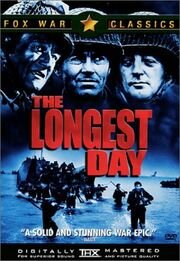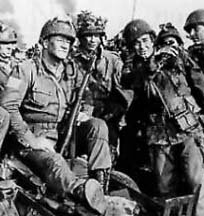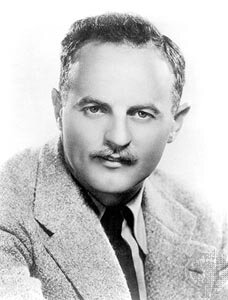 What made The Longest Day a hit?: In 1962, World War II was still fresh in the minds of the American people, most of whom were alive when it was being fought. In the intervening years, movies about the war became popular, but seventeen years after the war was over, super-producer Darryl F. Zanuck decided the time was right to make the biggest war movie of all, focusing on one of the turning points of the war- D-Day. Zanuck called upon Cornelius Ryan to adapt his exhaustive book, which approached the battle through many different perspectives, from the top brass on both sides to the men on the ground, and Zanuck even went so far as to have the French and German soldiers speak their own languages for the film rather than having everyone speak English.
What made The Longest Day a hit?: In 1962, World War II was still fresh in the minds of the American people, most of whom were alive when it was being fought. In the intervening years, movies about the war became popular, but seventeen years after the war was over, super-producer Darryl F. Zanuck decided the time was right to make the biggest war movie of all, focusing on one of the turning points of the war- D-Day. Zanuck called upon Cornelius Ryan to adapt his exhaustive book, which approached the battle through many different perspectives, from the top brass on both sides to the men on the ground, and Zanuck even went so far as to have the French and German soldiers speak their own languages for the film rather than having everyone speak English.
In addition, Zanuck enlisted an impressive cast- one that included John Wayne, Henry Fonda, Robert Mitchum, Richard Burton, Robert Ryan, Rod Steiger, Sal Mineo, Peter Lawford, Roddy McDowell, Curt Jürgens, Jean-Louis Barrault, Red Buttons, and an up-and-comer named Sean Connery- to help him pay tribute to the men who fought and died to help turn the tide for the Allied forces. It worked, and The Longest Day became one of the biggest hits of 1962, grossing almost $40 million domestically, trailing only another pair of super-productions- How the West Was Won and Lawrence of Arabia- at the yearly box office.
What happened?: While the American people saw World War II as both a military and a moral victory, the country was soon to enter into a conflict that wasn’t nearly so simple- Vietnam. As our involvement in Vietnam dragged on for years with no victory in sight, both the soldiers and the people at home were souring on the idea of war, especially as images of various atrocities began showing up on television. After Vietnam, war meant something very different to many Americans than it did after World War II, and the war movies that came out of Hollywood reflected this. The morality of these movies became more complex, with less cut-and-dried heroism and more characters questioning the validity of war. This coincided with the fall of the Production Code, and consequently battle scenes became much bloodier and more  chaotic. 1998 brought the most violent mainstream war movie of all, Steven Spielberg’s Saving Private Ryan, whose brutal take on D-Day quickly replaced The Longest Day’s comparatively tame recreation of the battle in the minds of most moviegoers.
chaotic. 1998 brought the most violent mainstream war movie of all, Steven Spielberg’s Saving Private Ryan, whose brutal take on D-Day quickly replaced The Longest Day’s comparatively tame recreation of the battle in the minds of most moviegoers.
Does The Longest Day still work?: Surprisingly, yes. Having been raised on violent, gritty anti-war movies, I expected a star-studded classically-styled movie about Normandy to come off as quaint. But it actually holds up pretty well. Much of this has to do with how its story is told- instead of re-creating the battle from one perspective, we see it from many angles- the Allied generals who planned it, the Germans who didn’t quite anticipate it going down like this, the paratroopers who were dropped inland, the men on the beach, the Resistance fighters, even the residents of the surrounding towns. Because of this, The Longest Day becomes less about morality than it does about tactics and strategy- hardly a contemporary approach to the war movie, but a compelling one nonetheless.
Even the star-studded cast worked better for me than I’d anticipated. Often, casting so many stars can be distracting, with the familiar faces taking the audience right out of the action. But here it’s almost necessary to keep all of the different plot strands straight. It helps that most of the big names are playing officers, so we can remember that Mitchum is leading the boys on Omaha Beach, Fonda heading the charge on Utah, Wayne commanding the paratroopers, and so on. Wayne’s presence is key here- he never fought in World War II himself, but he appeared in so many war movies both during and after the war that he fit the Hollywood mold of a soldier more than most of the stars who actually did fight.
One could make a similar claim for The Longest Day- it didn’t exactly look like war, but the classical Hollywood image of what war ought to look like. This isn’t  necessarily a bad thing, just a reflection of changing times. At one point in his career, Zanuck famously quipped, “There is nothing duller on the screen than being accurate but not dramatic.” The Longest Day fudged a number of details about D-Day (for example, a key battle takes place at an abandoned casino that hadn’t even been built yet in real life), but from a dramatic standpoint it works. And although it doesn’t correspond to our contemporary idea of what a war movie should be, it’s fascinating as an example of what was once the prevailing popular view of war, from a time when it was easier for us to feel that way.
necessarily a bad thing, just a reflection of changing times. At one point in his career, Zanuck famously quipped, “There is nothing duller on the screen than being accurate but not dramatic.” The Longest Day fudged a number of details about D-Day (for example, a key battle takes place at an abandoned casino that hadn’t even been built yet in real life), but from a dramatic standpoint it works. And although it doesn’t correspond to our contemporary idea of what a war movie should be, it’s fascinating as an example of what was once the prevailing popular view of war, from a time when it was easier for us to feel that way.